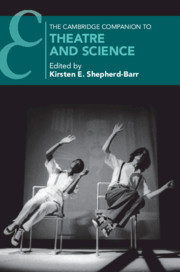Book contents
- The Cambridge Companion to Theatre and Science
- Cambridge Companions to Theatre and Performance
- The Cambridge Companion to Theatre and Science
- Copyright page
- Contents
- Illustrations
- Contributors
- Acknowledgements
- Introduction
- 1 Objectivity and Observation
- 2 Staging Consciousness
- 3 The Experimental/Experiential Stage
- 4 A Cave, a Skull, and a Little Piece of Grit
- 5 The Play at the End of the World
- 6 Bodies of Knowledge
- 7 Pathogenic Performativity
- 8 Theatres of Mental Health
- 9 Devised Theatre and the Performance of Science
- 10 Theatre and Science as Social Intervention
- 11 Acting and Science
- 12 Staging Cognition
- 13 Clouds and Meteors
- 14 ‘The Stage Hand’s Lament’
- Index
- References
7 - Pathogenic Performativity
Urban Contagion and Fascist Affect
Published online by Cambridge University Press: 20 January 2021
- The Cambridge Companion to Theatre and Science
- Cambridge Companions to Theatre and Performance
- The Cambridge Companion to Theatre and Science
- Copyright page
- Contents
- Illustrations
- Contributors
- Acknowledgements
- Introduction
- 1 Objectivity and Observation
- 2 Staging Consciousness
- 3 The Experimental/Experiential Stage
- 4 A Cave, a Skull, and a Little Piece of Grit
- 5 The Play at the End of the World
- 6 Bodies of Knowledge
- 7 Pathogenic Performativity
- 8 Theatres of Mental Health
- 9 Devised Theatre and the Performance of Science
- 10 Theatre and Science as Social Intervention
- 11 Acting and Science
- 12 Staging Cognition
- 13 Clouds and Meteors
- 14 ‘The Stage Hand’s Lament’
- Index
- References
Summary
Chapter 7: This chapter looks at two recent performances, Arinzé Kene’s Misty (2018) and Neil Bartlett’s The Plague (2017), which depict cities under siege. Contagions, figurative and literal, spread among residents, destroying lives and tearing the fabric of the urban environment. In both productions the city is at war with itself, via the circulation of disease that passes between infrastructure and people. Focusing on these plays and their productions, this chapter explores how ideas of contagion are deployed to capture a sense of intangible danger spreading throughout the city, especially London, and how this formulation finds impetus in contemporary discourse that mobilizes the risk of economic, cultural, and political contagion as part of a divisive rhetoric. The chapter also considers how we might understand these forms of representation and discourse in light of the prevalence of ‘pathogenic performativity’, in which the language and phantasmagoria of contagion are deployed as tactics of governance, with theatre enabling its exposure or perpetuation.
- Type
- Chapter
- Information
- The Cambridge Companion to Theatre and Science , pp. 101 - 115Publisher: Cambridge University PressPrint publication year: 2020



